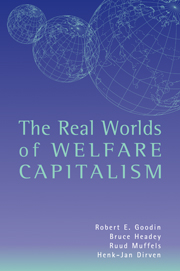Book contents
- Frontmatter
- Contents
- Preface
- Acknowledgments
- 1 Introduction
- Part I Setting the scene
- Part II One standard of success: external moral criteria
- Part III Another standard of success: internal institutional criteria
- 13 The United States as a liberal welfare regime
- 14 The Netherlands as a social democratic welfare regime
- 15 Germany as a corporatist welfare regime
- 16 Conclusions
- Appendix tables
- References
- Index
16 - Conclusions
Published online by Cambridge University Press: 22 September 2009
- Frontmatter
- Contents
- Preface
- Acknowledgments
- 1 Introduction
- Part I Setting the scene
- Part II One standard of success: external moral criteria
- Part III Another standard of success: internal institutional criteria
- 13 The United States as a liberal welfare regime
- 14 The Netherlands as a social democratic welfare regime
- 15 Germany as a corporatist welfare regime
- 16 Conclusions
- Appendix tables
- References
- Index
Summary
Ours is a book principally devoted to exploring what difference alternative welfare regimes make to people's lives. In previous chapters the discussion of differences has accordingly enjoyed pride of place. In concluding, however, it is only proper to set those differences firmly in perspective. Importantly different though welfare regimes are, in many ways what matters more are features that all of them have in common.
It bears emphasizing, for example, that in all the countries we have studied the vast majority of people are not poor at any given time, and a sizeable fraction of them never will be. In all three countries, most of those who do fall into poverty will not remain poor for long, one way or another. Finally, in all three countries government is a ‘force for good’, whether defined in terms of reducing poverty, increasing equality, promoting integration, underwriting stability or furthering autonomy.
Some governments promote those goals better than others, to be sure, and they do so more or less efficiently. Discussion of those differences will once again come to the fore later in this concluding chapter. But to set that discussion in proper perspective, it is important to emphasize that choosing between alternative welfare regimes is less a matter of choosing the ‘lesser of evils’ than of choosing the ‘greater of goods’. Any of the welfare regimes under review is better, in any of those ways, than is the uncorrected market.
- Type
- Chapter
- Information
- The Real Worlds of Welfare Capitalism , pp. 259 - 264Publisher: Cambridge University PressPrint publication year: 1999



